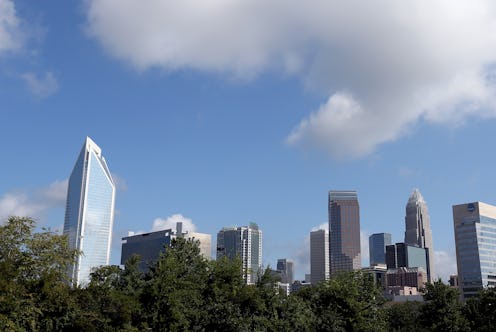News
An Unarmed Man Was Shot By Police
On Aug. 18 in my hometown of Charlotte, North Carolina, a state trooper shot and killed Daniel Harris, an unarmed deaf man. Following a brief chase which resulted from a traffic stop, a state trooper named Jermaine Saunders shot and killed Harris, 29, outside of his home. Harris, who was deaf and speech-impaired, was unarmed, and witnesses at the scene claim that Saunders shot Harris not long after he stopped in front of his house. It's not clear whether Harris understood exactly what was going on. (Saunders has been placed on leave pending an investigation.) Harris was also white. I mention this because, as all who follow the unhappy news of fatal police shootings know, race matters.
The particulars of this case are unique, of course — especially the fact that Harris was deaf. But I'm nonetheless reminded of another shooting of an unarmed man in Charlotte which happened almost exactly three years ago, when police officer Randall Kerrick shot and killed Jonathan Ferrell, a Black man who was running toward the police for help after an accident when they issued the fatal shots. Exactly one year ago yesterday, a judge declared a mistrial in the manslaughter case against Kerrick.
In the police shooting of Harris, as with the police shooting of Ferrell, I — as a Charlottean and anti-police-brutality activist — find myself in a position unique to those in the growing list of locales where such tragedy strikes: an insider watching the world look in. Grateful for the coverage, but hating the pressure of the attention. The urge to protect one's own community and is strong.
As the list of affected cities grows, millions of people have and will become affected by this, merely by living in the areas where they happen. In an interview with the Orlando Sentinel, grief counselor Veronica Sites called this phenomenon "the proximity effect of tragedy," and said that cataclysms like the Orlando Pulse shooting shock us to our cores because they "literally hit home."
My stepdad worked in retail with Ferrell. I know the streets that officers chased Harris down. I likely know people who knew him. To read about mind-boggling violence in a city you're unfamiliar with is one thing; to hear about it happening near your mom's house creates a hollow, dull terror. "I know that place" was all I could think.
In an article for The Daily Beast, Shani Gilchrist discusses what it felt like to be a new resident to Charleston after Dylann Roof shot and killed nine parishioners at the Emanuel AME Church. Although our experiences are, of course, vastly different, I identified with this:
As the first anniversary of the shooting looms, I cannot write a piece about what happened and include facts, figures, and interviews. This is my home now, too, and Mother Emanuel is a very kind neighbor. I can’t write about it with any objectivity because it’s too close, and it hurts too much, and there are no answers, and things are not going to be okay anytime soon.
It would be disingenuous of me to not discuss the "other"-ing of the victims in these parallel tragedies that struck my hometown. Ferrell was a Black man and Harris was deaf. Those simple identifiers add a world of nuance to their murders, and much ink (digital and otherwise) about the mistreatment of and violence against Black people and disabled people (and, of course, the intersections of race and disability) has and will continue to be spilled. Neither are identifiers that apply to me. When it comes to my identity, news of violence against Arabs, Muslims, and LGBTQ people are what shake me to my core.
Many who share identities with victims of police brutality, hate crimes, and other identity-based forms of violence are intimately familiar with the feeling that accompanies seeing the faces or reading the names of people who were murdered and thinking, "that could be me." The sense of proximity is similar, and unfortunately, many of those who are from or live in Charlotte, Baton Rouge, Ferguson, Charleston, Orlando, New York, and too many other cities to name are subjected to both a sense of spatial trauma and trauma based on racial, religious, or sexual identities that they share with the poor souls killed for reasons we will never understand.
On Monday night, there was a vigil for Harris in Charlotte, and there will likely be vigils again on September 14, the three-year anniversary of Ferrell's death. Time will go on, and when the next mass shooting or police-involved murder happens (because at this point, it's a matter of when rather than if), Charlotte will fall below the radar of the average American — just another name in the increasingly loud undercurrent of senseless tragedy going on everywhere in the world.
Many who share identities with victims of police brutality, hate crimes, and other identity-based forms of violence are intimately familiar with the feeling that accompanies seeing the faces or reading the names of people who were murdered and thinking, "that could be me."
But in Charlotte, we won't forget Daniel, and we haven't forgotten Jonathan.
You can donate to the crowdfunding page set up in Daniel's honor here.
